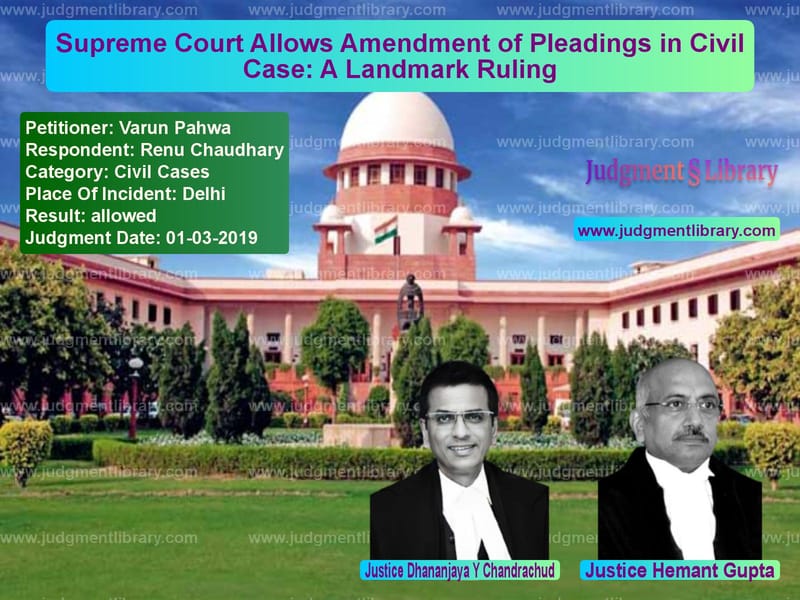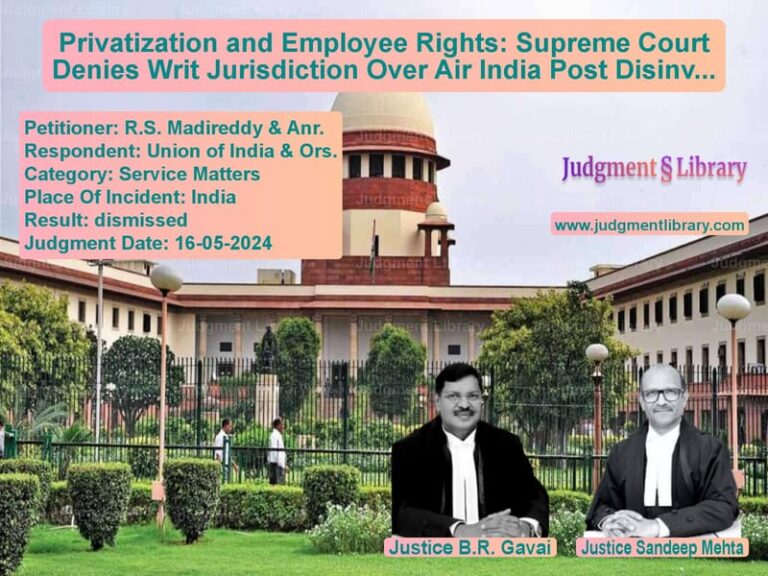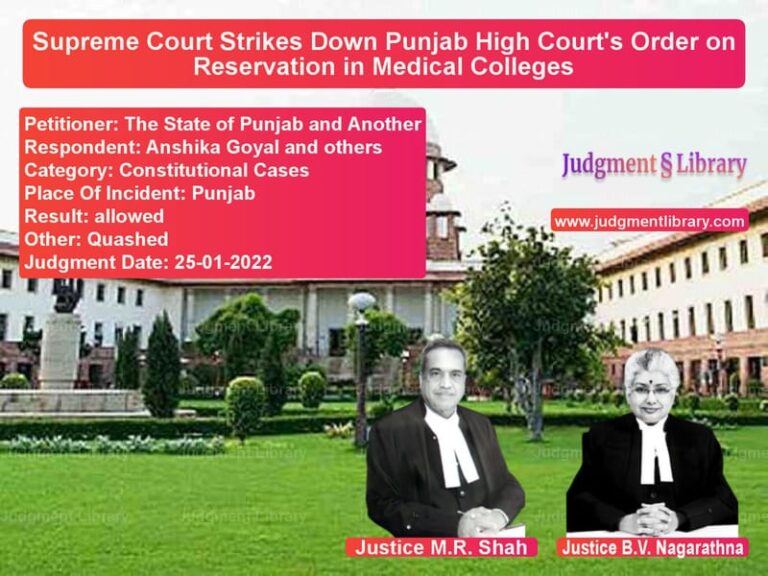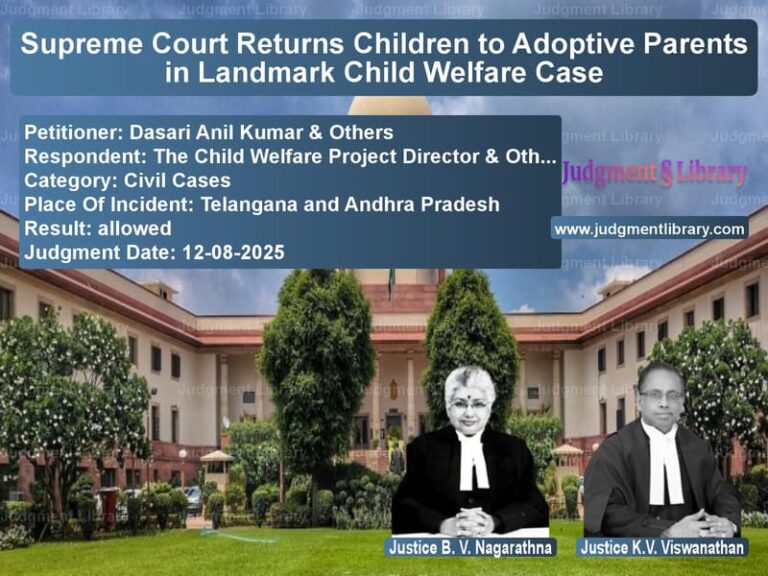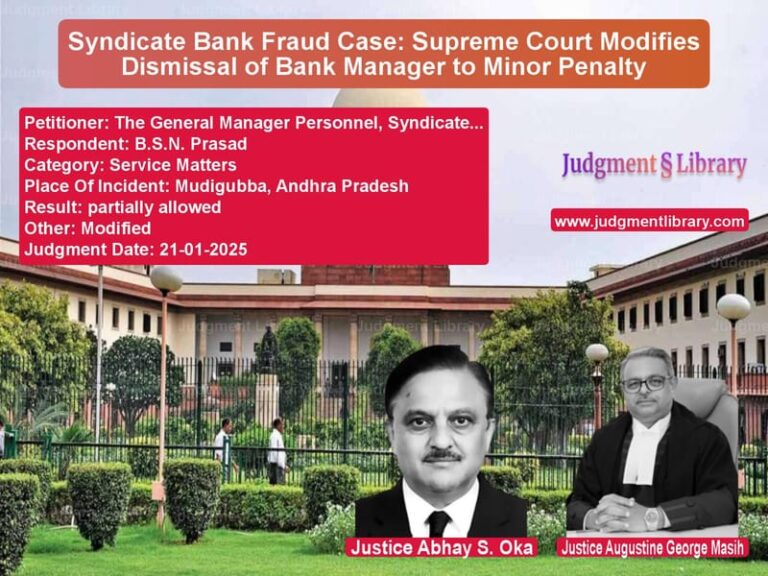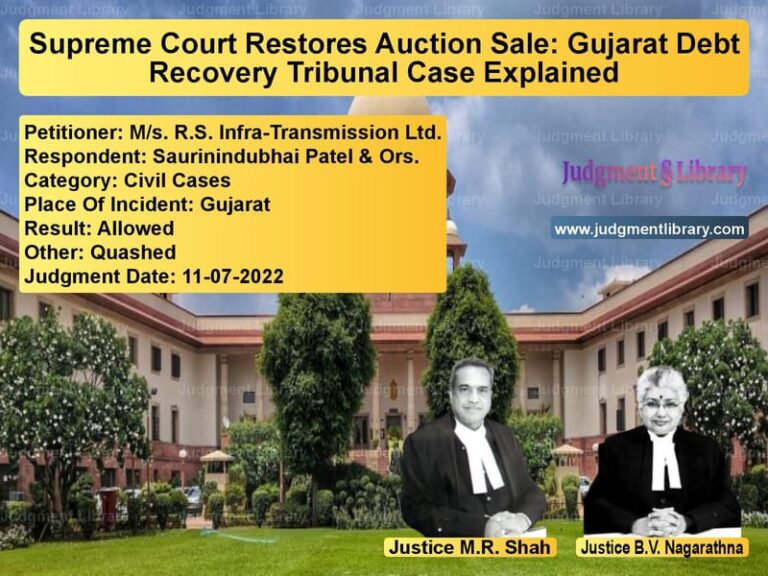Supreme Court Allows Amendment of Pleadings in Civil Case: A Landmark Ruling
The Supreme Court of India, in the case of Varun Pahwa v. Mrs. Renu Chaudhary, has delivered a crucial judgment concerning the amendment of pleadings in civil cases. The decision underscores the principle that procedural laws should not be used to defeat substantive justice. The judgment, authored by Dr. Dhananjaya Y. Chandrachud and Hemant Gupta, emphasizes that errors in the drafting of legal documents, particularly inadvertent mistakes by counsel, should be rectifiable to ensure fair adjudication.
Background of the Case
The dispute arose when the appellant, Varun Pahwa, filed a recovery suit amounting to Rs. 25,00,000/- against the respondent, Mrs. Renu Chaudhary. The loan amount was transferred through RTGS on 16.06.2013 from HDFC Bank, Delhi. The suit was initially filed by the appellant in his personal capacity, although the transaction had actually been conducted through Siddharth Garments Pvt. Ltd., where the appellant was a director.
The trial court, and subsequently the Delhi High Court, rejected the appellant’s request to amend the plaint to reflect the correct plaintiff, i.e., the private limited company instead of an individual.
Arguments Presented
Petitioner’s Arguments
The appellant contended that the incorrect title in the plaint was due to an inadvertent mistake by counsel and sought to amend the following paragraphs:
- Paragraph 1 to state that the plaintiff is Siddharth Garments Pvt. Ltd.
- Paragraph 2 to clarify that the suit was filed through an authorized representative, namely Navneet Gupta, based on a board resolution dated 12.05.2016.
The amendment was necessary to ensure that the entity which had actually extended the loan was correctly represented in the proceedings.
Respondent’s Arguments
The respondent opposed the amendment on the ground that it would change the nature of the suit entirely, converting it from an individual’s claim to a corporate claim. The trial court agreed with this contention, stating that allowing the amendment would amount to substituting a new plaintiff, which is not permissible under procedural laws.
Supreme Court’s Observations
The Supreme Court, while analyzing the case, held that the Rules of Procedure should act as a handmaid to justice rather than defeating substantive rights. The Court noted:
“The memo of parties is thus clearly an inadvertent mistake on the part of the counsel who drafted the plaint. Such inadvertent mistake cannot be refused to be corrected when the mistake is apparent from the reading of the plaint.”
The Court relied on established precedents to emphasize that procedural mistakes, even if due to negligence, should be corrected to prevent injustice. It referred to its earlier rulings, stating:
“A party cannot be refused just relief merely because of some mistake, negligence, inadvertence, or even infraction of procedural rules.”
Key Legal Precedents Cited
The Supreme Court drew from several landmark cases to reinforce its reasoning:
- State of Maharashtra v. Hindustan Construction Co. Ltd. (2010) 4 SCC 518 – The Court held that procedural rules should not defeat substantive justice.
- Jai Jai Ram Manohar Lal v. National Building Material Supply (1969) 1 SCC 869 – The Court ruled that amendments should be allowed unless there is clear mala fide intent.
- Uday Shankar Triyar v. Ram Kalewar Prasad Singh (2006) 1 SCC 75 – The judgment emphasized that curable procedural defects should not be used to deny justice.
Final Judgment
The Supreme Court allowed the appeal, setting aside the orders of both the High Court and the trial court. It permitted the amendment of the plaint, stating that denying the amendment would result in injustice.
“The power to grant amendment of pleadings is intended to serve the ends of justice and is not governed by narrow or technical limitations.”
Implications of the Judgment
This ruling reaffirms the principle that technicalities should not override substantive justice. The judgment is particularly significant for corporate litigation, ensuring that minor drafting errors do not lead to unjust results. It also provides clarity on how courts should approach amendments that seek to correct inadvertent mistakes.
Conclusion
The Supreme Court’s judgment in Varun Pahwa v. Mrs. Renu Chaudhary serves as an important precedent in civil litigation, reinforcing the principle that procedural rules should facilitate, rather than obstruct, justice. This decision provides much-needed flexibility in correcting errors in pleadings, ensuring that courts focus on the merits of a case rather than mere technicalities.
Petitioner Name: Varun Pahwa.Respondent Name: Renu Chaudhary.Judgment By: Justice Dhananjaya Y Chandrachud, Justice Hemant Gupta.Place Of Incident: Delhi.Judgment Date: 01-03-2019.
Don’t miss out on the full details! Download the complete judgment in PDF format below and gain valuable insights instantly!
Download Judgment: Varun Pahwa vs Renu Chaudhary Supreme Court of India Judgment Dated 01-03-2019.pdf
Direct Downlaod Judgment: Direct downlaod this Judgment
See all petitions in Contract Disputes
See all petitions in Damages and Compensation
See all petitions in Judgment by Dhananjaya Y Chandrachud
See all petitions in Judgment by Hemant Gupta
See all petitions in allowed
See all petitions in supreme court of India judgments March 2019
See all petitions in 2019 judgments
See all posts in Civil Cases Category
See all allowed petitions in Civil Cases Category
See all Dismissed petitions in Civil Cases Category
See all partially allowed petitions in Civil Cases Category

